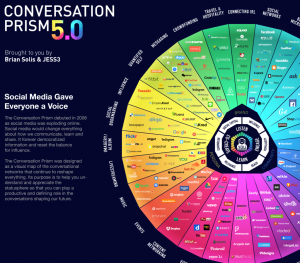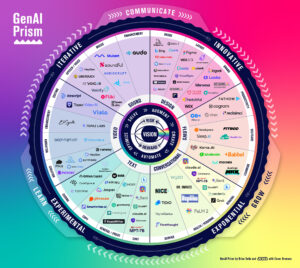In recent times, I’ve noticed a rise in discussions around the “death of social business” and also an increase in alternative “fill in the blank but don’t use the word social” businesses. Some of those discussions have been hosted here recently. There’s strong merit to the discussions of course, especially those I’ve hosted (be sure to read the comments). But as an analyst tracking the evolution of social businesses and equally the cause and effect of digital transformation overall, I’m learning that the most advanced organizations see social not as a technology movement but instead one of culture and philosophy. Openness, collaboration, transparency, communication…these aren’t buzz words. Among those leading change, these words represent a way of business and it all starts with vision and the ability to see how relationships and experiences with customers and employees can improve or accomplish new and greater goals.
Along the way, I’ve also learned that pushing for social adoption because of technology misses the point of change. The true catalyst isn’t whatever the latest trend in social media is this week. That’s reactive and almost impossible to leapfrog. The truth is that change is fueled by the affect that social media, mobile, and other forms of disruptive technologies have on customer behavior. Whether it’s B2B, B2C, B2B2C, or whatever model you prefer, as long as we’re talking about connected human beings, you can bet that social and digital in general are influencing discovery, decision-making, and impressions in every moment of truth.
The evolution of social business as we know it today traces back to The Cluetrain Manifesto in the late 1990s, where its authors predicted that markets would become conversations. Here we are at the cusp of 2014, and businesses, and the strategists who lead social efforts, continue to struggle with sparking executive understanding, adoption, and leadership. The real story is about what’s happening beneath all that we see or think we see.
So what’s obstructing the evolution of social business?
Part of the problem is that social media and how it differs from traditional channels remains largely misconstrued. As a result, new opportunities, and the strategies, systems, and processes that support them, are either nascent or overlooked.
A social business is more than an organization that invests in a positive global footprint to overcome the world’s biggest problems, such as inequality and poverty. The term has developed to now also represent companies that are more open, transparent, and participatory in conversations and activity that defines markets. But the challenge is that social media strategists may actually be hampering its potential by not helping executives see the bigger picture beyond the technology.
Last month, Charlene Li and I published our latest Altimeter Group report, “The State of Social Business 2013.” In our research, we were surprised that businesses were still unsure of the role social media played enterprise-wide, beyond marketing and communications. Many, we found, were limited in scope and not universal in engagement with customers, employees, suppliers, partners, community, et al. Specifically, we learned that…
– Only half (52%) of companies say that their executives are informed, engaged, and aligned with the enterprise social strategy
– A mere 26% of organizations self-describe as being “holistic” in their social media approach, where business functions operate against an enterprise-level vision and strategy
– Just 17% of organizations self-described as being truly “strategic” in the execution of their social strategies
This month, Charlene and I are releasing the data charts from our latest report, plus additional material, to help strategists learn how to amplify or accelerate their social business strategy. The charts are available as stand-alone images on Flickr or as a complete deck via Slideshare. As always, this information is made available freely as part of Altimeter’s open research program. Please feel free to use the images or slides at work, in posts, on stage, or whichever way that helps you make a point or case.
Along with highlighting major issues (and opportunities) through this survey data, the presentation includes perspectives and inspirational quotes from executives and strategists at Sephora, Adobe, ARAMARK, Ford, Fidelity, Royal Dutch Shell, Wells Fargo among others.
We hope that you’ll find the slides in this presentation useful as resource and background material, as you continue to make your business case for social business.






It is interesting to think of the real impact of social media on business. When I “sold” admissions to a university, we were told people will sign up to become students if they like you. They put their trust in you and believe you are there to help them. Taking into account the larger picture of an entire organization. A conversation as you said happens via social media channels and people decide “the moment of truth” whether they like and/or trust an organization. It can happen that quickly and last for years.
Thank you for the comment Charmian!
Thank you as always for your excellent and updated report. I’m at a loss to find a good event that is all about social media management for enterprise (and better still in government) and SMMS system exploration from an agnostic point of view. I wondered whether you were aware of any?
Thank you!
I think you should speak to my colleague Andrew Jones. He can help. andrew@altimetergroup.com
Great Article,
I agree with the information you present. Social Business is not dead, it is just evolving as many new things do. I remembered the internet bubble burst in the 2000. Internet evolve and become stronger. As many new concepts, at first many people create a “Gold Rush” mentality. When things take the right level again, it becomes more stronger and sophisticate. Today many people auto-proclaim them self as Social Media expert, but just few keep learning, adapting, and evolving with the new trends. Happy Holidays to you and all.
hi and thanks from cold and greyGermany! it was very interesting to read this article, keen looking to more news about it . my buying and selling job i do traditionally in a lot of countries all over the continents and as written below by Charmian the “the moment of truth” is the most important, if the deal is done by internet, phone, letter, however. and when we have the support by a good working social media around, life will be easier. i believe it.
Happy Holiday time to all of you!
This is first time i’m reading your article and I just got awesome reading experience.
Social Business in its ideal form focuses primarily on the needs of the community (society at large) and their environment as oppose to on the needs of an particular individual or small faction thereof. Its fully realized when the wider community is thriving, not just a hand full of top level executive and elites. It begins with believing in this reality and placing a higher value on people over profits. This is not an easy pill for people with elitist, scarcity, extreme capitalist, competitive mindsets to swallow and accept, hence the slow adoption of convictions in values like collaboration, everyone, transparency, openness, oneness, abundance, infinity….the ultimate reality…. its inevitable if we are to eventually thrive as a society of highly intelligent, wise and compassionate beings.
Hey Brian,
Good stuff, thanks for sharing.
I revisited the set of data today and I was just wondering, from your set of 65 digital strategists’ responses to how enterprises characterise themselves in social business maturity (Slide 5), are they all large organisations?
Jason
Hi Jason, Thanks for your inquiry. I worked with Brian on the data side of the report. The 65 digital strategists were from companies with more than 1,000 employees. Hope that helps! -Jaimy Szymanski, Senior Researcher
It did, Jaimy. Thank you!